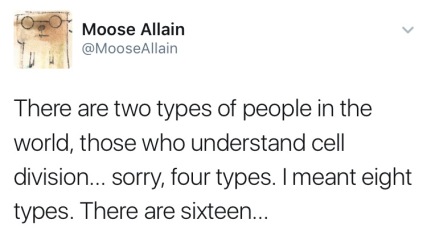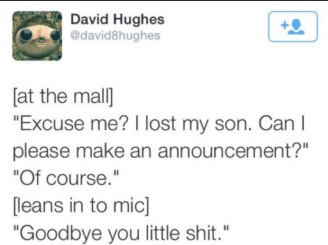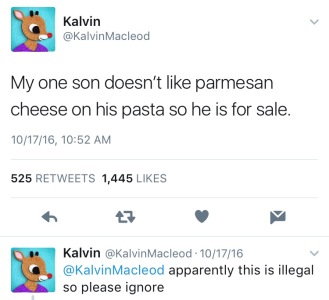Who doesn’t love a good joke? Lots of people pay hard-earned money to see comedians stand on stage and make them laugh. But have you thought about what makes a joke funny?
There’s an element of surprise when a joke makes you laugh. You expect a story or situation to go one direction, and it ends up going another in an amusing way.

The other day, I was talking with Dan about writing surprises in a story – twists, if you will. A good twist needs a few things to be most effective, but it need not be complicated. In fact, twist-writing and joke-telling have a few things in common.
1. They both play on common experiences.
Consider the joke tweet by Jonnysun up there. With the first two lines, we’re in a scene with a tired mall Santa at the end of a long day. We expect a tale involving settling in, maybe getting a drink, perhaps reflecting on life.
We do not expect him to take out his eyeballs. That’s outside our common experiences.

This one starts us off with a common setup – there are two types of things in the world, this and that. We expect there to be a this and that, not an exponentially growing number. A basic understanding of cellular biology allows you to get the humor.
 In writing a plot twist, the author has to tap into those common experiences and play on them for as long as possible. Then, they have to know to what end logic and experience will lead and go the other way.
In writing a plot twist, the author has to tap into those common experiences and play on them for as long as possible. Then, they have to know to what end logic and experience will lead and go the other way.
Consider the twist at the end of The Sixth Sense. Experience tells us that because Bruce Willis is working with a child, he is alive and will ultimately cure the child of his hallucinations (because this is a story and stories have solutions). We believe this for the entire movie, because the ghosts were presented a certain way and Bruce Willis didn’t look that way. He seems to talk to other people besides the kid, he sits on furniture, he worries about upsetting his wife – all behaviors that belong to the living. So when that big twist hit us, we were so shocked we still blog about it eighteen years later.
Both jokes and plot twists are basically this: “Here is something we all understand. Now I’ll take you on a journey into something you didn’t see coming.”
2. They both require a setup.
Plot twists and punch lines don’t come out of nowhere. They have to be set up for maximum impact.

That tweet-sized joke has a setting and dialogue. It plays on our expectations that a loving father would ask anyone seeing his child to kindly return him. But he went the other way.
One of my favorite jokes to come out of the George W. era was this one.
George W. Bush was receiving his daily report from his Defense Secretary, Donald Rumsfeld.
During the report, Rumsfeld said, “And yesterday, three Brazilian soldiers were killed in Iraq.” George suddenly went pale, put his head in his hands and began to sweat profusely.
His staff were astounded. They had never seen the president react like this to such a small loss. Then, after he had recovered slightly, the president brought his head up and quietly asked the aide next to him, “Just how many in a brazilian?”
A longer setup was required but the payoff made it worth the time. When I tried to repeat this joke from memory, I messed up the setup and it wasn’t nearly as funny.
 While a plot twist can be a sudden, surprising event, the best plot twists require clues and foreshadowing. These are the ones that make the reader look back and go, “Of course!” If you watch the bonus features of The Sixth Sense, the director tells you what all the clues were leading up to the twist. In another case, Hagrid telling Harry Potter he’s a wizard was a twist that happened early in the story but still had lots of clues leading up to it.
While a plot twist can be a sudden, surprising event, the best plot twists require clues and foreshadowing. These are the ones that make the reader look back and go, “Of course!” If you watch the bonus features of The Sixth Sense, the director tells you what all the clues were leading up to the twist. In another case, Hagrid telling Harry Potter he’s a wizard was a twist that happened early in the story but still had lots of clues leading up to it.
Clues and foreshadowing play on expectations. Even if the reader is expecting something surprising might happen, they will naturally predict the most logical end. So the twist is still a surprise. Which leads me to the last point…
3. They both have an element of surprise.
In a joke, the surprise makes you laugh.

No one expected the sh- word to appear in a tweet about Dr. Seuss.

The reply to that one adds to the humorous surprise.

That hypothetical surprise would lead to many laughs. Especially for Yoda.
Depending on the story, the surprise in a plot twist makes you cringe, cry, laugh, or throw the book. The bottom line is jokes and plot twists both offer emotional impact. And if they’re good enough, people will talk about them for years.
Do you remember who Kaiser Soze was?
Exactly. And that twist is 22 years old.
So if you’re struggling with how to write plot twists, think of telling jokes and what makes them work. You can also check out this post I wrote for Dan’s blog a while back.
What are some of your favorite jokes or plot twists? Regale us in the comments!


Pingback: 9 Tips for Writing Better Short Stories – A Writer's Path
Pingback: 9 Tips for Writing a Short Story | Allison Maruska
Pingback: The Perk of Predictability in Stories | Allison Maruska
Pingback: Story Stuff: H Is For Humor | Allison Maruska
Pingback: 3 Tips for Writing AMAZING Plot Twists | Dan Alatorre - AUTHOR
I like the cell division one, too.
LikeLiked by 1 person
That one has infinite potential. LOL
LikeLiked by 1 person
I like this one: There are three kinds of people in this world: those who can count and those who can’t.
LikeLiked by 1 person
Or this one: There are two kinds of people in the world – those who can extrapolate from incomplete data
LikeLike
Pingback: Three Ways Writing A Plot Twist Is Like Telling A Joke — Allison Maruska | Arrowhead Freelance and Publishing
Pingback: Three Ways Writing A Plot Twist Is Like Telling A Joke – All About Writing and more
Reblogged this on The Owl Lady.
LikeLiked by 1 person
Thanks for the reblog! 🙂
LikeLike
Reblogged this on Don Massenzio's Blog and commented:
Here is some insight into writing plot twists from Allison Maruska’s blog
LikeLiked by 1 person
Thanks for the reblog!
LikeLiked by 1 person
You’re welcome
LikeLike
Reblogged this on Writing and Musing and commented:
These jokes are great. The points made about plot twists needing set up and an element of surprise are spot on!
LikeLiked by 1 person
Thanks for the reblog! 😁
LikeLike
Thanks for the post! The jokes you picked were great!
LikeLiked by 1 person
Nice! I liked the one about the Grinch. Almost made me laugh out loud.
Allllllllmost.
LikeLiked by 1 person
It did make me laugh out loud. 😆
LikeLiked by 1 person
I figured. It was good.
LikeLiked by 1 person